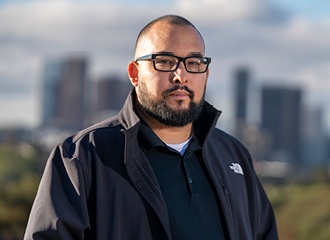At a Low Point, Veteran Finds a Path to Sobriety and Success
3-minute read
At a Low Point, Veteran Finds a Path to Sobriety and Success
3-minute read
Manuel wants his story to serve as an inspiration to other Veterans with substance use disorders—showing that, no matter how difficult or dire their situation seems, there is a path to restoring their livelihoods and relationships.
“I was in handcuffs; I was in prison,” says Manuel, now a peer support specialist. “But I work for the VA now. And I get to make a difference every day and be the proof to Veterans that change is possible.”
“I was scared to ask for help. It took me to prison ’cause I was so scared to ask for help,” he adds. “But once I did, there’s no ceiling to the successes I’ve had.”

“Now I have the tools.” Veteran Recounts the Treatments That Helped Him Become Sober
A military career cut short
Manuel fell in love with military life after joining the U.S. Navy in 2005. He served as first a quartermaster and then a legalman. But on his second deployment, contracting tuberculosis started a downward spiral.
The illness contributed to a decline in performance and what Manuel describes as a “psychotic break.” Eventually, it led to his forced departure from the Navy in 2011.
“Getting kicked out, losing my job, having a wife and two kids, I really was lost,” he says.
Drug use and prison time
After his departure from the Navy, Manuel attended nursing school. But he also had become addicted to the Adderall he had been prescribed. Then he began to use methamphetamine.
Manuel turned to crime to help pay for the drugs. He got caught and was sentenced to a lengthy prison term.
It was during his prison time, however, that Manuel began to turn his life around through cognitive behavioral therapy and 6 months in a substance use treatment program.
Therapy and success
“I understood through cognitive behavioral therapy, I was using drugs to really try to cover up some of my traumas,” Manuel says. “Not only the traumas from my childhood, but the traumas from really losing my dream job. Cognitive behavioral therapy really, really made a difference in my life.”
That difference became evident soon after his release.
“I did really good out of prison professionally,” he says. “Got into a bachelor’s program, got into a master’s program, just got into a doctorate, went from literally no money to making six figures within my first year out of prison.”
Manuel also found more stability through his counseling for posttraumatic stress disorder (PTSD) and through cognitive behavioral therapy, dialectical behavioral therapy, and eye movement desensitization and reprocessing therapy. And he says speaking to a therapist taught him to be the dad he’d always dreamed of being.
The therapy has instilled Manuel with the confidence that he’ll continue to make progress. “I still have a lot of work to do,” he says, “but now I have the tools.”

